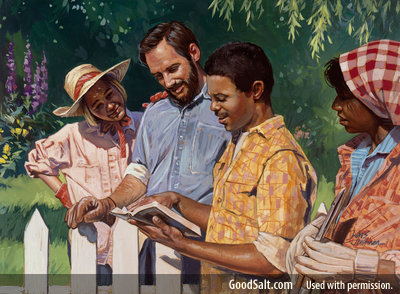“I am the vine, you are the branches. He who abides in Me, and I in him, bears much fruit; for without Me you can do nothing.” John 15:5
We are learning from Jesus in John 15:1-8, how to become more fruitful for the Lord. We can become more fruitful for the Lord when we….
– Realize that Jesus is our only source of life (John 15:1).
– Receive Jesus’ encouragement from His word (John 15:2a).
– Recognize the pruning process (John 15:2b-3).
The fourth way to become more fruitful for the Lord is to REMAIN IN CHRIST BY OBEYING HIS WORD (John 15:4-5). Christ said to His eleven believing disciples, “2b Every branch that bears fruit He prunes, that it may bear more fruit… 5 I am the vine, you are the branches. He who abides in Me, and I in him, bears much fruit; for without Me you can do nothing.” (John 15:2, 5). Jesus wants us to go from bearing “more fruit” (15:2b) to bearing “much fruit” (15:5). How? By abiding in Him.
Jesus said, “4 Abide in Me, and I in you. As the branch cannot bear fruit of itself, unless it abides in the vine, neither can you, unless you abide in Me. 5 I am the vine, you are the branches. He who abides in Me, and I in him, bears much fruit; for without Me you can do nothing.” (John 15:4-5). The word “abide” (menō) means “to remain, continue, make one’s home at.” 1 Jesus defines abiding as obeying His commandments. “If you keep My commandments, you will abide in My love, just as I have kept My Father’s commandments and abide in His love.” (John 15:10). John also defines abiding in this way, “Now he who keeps His commandments abides in Him.” (I John 3:24a).
A branch on a grapevine has no life in itself because it draws life from the vine. As long as there is an uninterrupted flow of life from the vine into the branch, the branch is capable of bearing fruit. But the moment the branch is severed from the life of the vine, it cannot bear fruit. What is true in the natural realm is also true in the spiritual realm (cf. John 15:4-5). Jesus is our vine or source of life and fruit. The moment we believed in Christ for eternal life, He placed us in Himself as branches so we may bear fruit. As long as we “abide in Him” we can “bear much fruit.”
It is our responsibility to “abide” in Jesus by obeying His commandments (John 15:4-5, 10; I John 3:24a). Jesus promises that He will abide in us when we abide in Him (“Abide in Me and I in you… He who abides in Me, and I in him.”). When we abide in Jesus by keeping His commandments, we can enjoy close fellowship or intimacy with Him. We cannot experience Jesus’ abiding presence in our lives if we are living in disobedience to Him. We must stay connected to the Vine so Christ’s life in us can produce fruit that honors the Father. If we stop abiding in Christ, we “cannot bear fruit” because branches can only bear fruit when they are connected to the vine. 2
When Jesus says, “For without Me you can do nothing,” He means that believers cannot do anything that glorifies the Lord when they are living in disobedience to Him. Every day Christians have a choice to obey the Lord or disobey Him. When we choose to live in obedience to the Lord, He can produce “much fruit” in our lives that glorifies God the Father. Since Jesus is the only One Who can provide the spiritual sustenance and vitality we need to be useful believers, we must spend time with Him. “You can’t avoid Jesus all week and then show up on Sunday morning expecting growth. We only produce much fruit when we remain in Him (15:5).” 3
I have discovered in my own Christian life that as I grow older in the Lord, I may have a tendency to rely on my own abilities and competency. It is common for us to struggle with self-reliance in areas of our greatest strengths. For example, in February/March 2017 on a couple of mission trips in the Philippines, I began to experience more difficulties in areas of my greatest strengths which were evangelism and teaching. God used that painful time in my life to show me how much I was relying upon my own abilities and wisdom instead of His.
Jesus Christ has commanded us to preach the gospel to everyone (Mark 16:15) and to make disciples of all nations (Matthew 28:19-20). These commands are not content for our minds, they are commands for our will. When Jesus says to do something, do it! He is more interested in our obedience than our opinions.
In February 2018 before I went on a mission trip to the southern Philippines, I thought I was losing my zeal for evangelism. I thought if I led thousands of people to Christ on that trip, it would increase my enthusiasm for evangelism. But God had other plans. At our very first evangelistic film showing, only one person came forward to indicate she was trusting Christ for His gift of salvation. At first, I was so disappointed. “Only one person?” I thought to myself. “What am I doing wrong?”
The Lord convicted me by reminding me that it is not how many people that come to Christ that determines my fulfillment and enthusiasm in evangelism. It is not the fruit! My enthusiasm and fulfillment come from staying connected to Jesus Christ – the only Source of Life! We can be just as fulfilled leading one person to Christ as a thousand – if we stay connected to the True Vine – the Lord Jesus Christ.
Prayer: Dear Lord Jesus, I cannot do anything that glorifies and pleases God the Father apart from You. When I try to honor the Father in my own strength, life takes a turn for the worse and I have no sense of joy or fulfillment. Forgive me for focusing more on the fruit than on the Fruit Producer. Please show me how to abide in You and You in me so Your life can flow through mine and produce much fruit for the glory of the Father. In Your life-giving name I pray. Amen.
ENDNOTES:
1. A Greek-English Lexicon of the New Testament and Other Early Christian Literature, compiled by Walter Bauer, trans. and adapted by William F. Arndt and F. Wilbur Gingrich, 2nd ed., rev. and augmented by F. Wilbur Gingrich and Frederick W. Danker (Chicago: University of Chicago Press, 1979), pp. 503-504.
2. Robert Wilkin; J. Bond; Gary Derickson; Brad Doskocil; Zane Hodges; Dwight Hunt; Shawn Leach. The Grace New Testament Commentary: Revised Edition, (Grace Evangelical Society, Kindle Edition, 2019), pg. 534.
3. Tony Evans, CSB Bibles by Holman. The Tony Evans Bible Commentary (B&H Publishing Group, Kindle Edition, 2019), pg. 1806.












